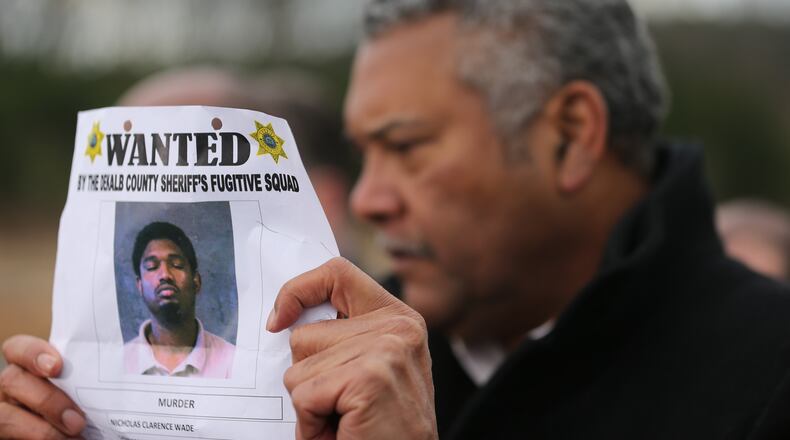A man serving a prison sentence of life without parole for killing an 18-month-old boy can pursue an excessive force claim against one of the deputies who arrested him, the federal appeals court in Atlanta has ruled.
In February 2014, Nicholas Wade was sitting in his girlfriend’s car in a Lithonia church parking lot when it became surrounded by officers. They had been pursuing Wade for the beating death of his girlfriend’s son, Keon Belk.
Wade could be seen holding a sawed-off shotgun with the barrel pointed at his chin and sitting next to his girlfriend, Jillian Belk. According to court records, Deputy Solomon Daniels fired three shots at Wade, hitting him in the head, shoulder and leg.
After Wade dropped the shotgun and crumbled into the car’s center console, Daniels said, “I shot that (expletive) in the head” and that “(expletive) will die any minute,” the ruling said.
After Wade was handcuffed and pinned down, he complained that he was suffocating from the blood filling up his mouth. When he tried to sit up, Deputy Victor Jones slammed his gun into Wade’s face, chipping a tooth and cutting his face.
In 2015, Wade was tried and convicted of Keon’s murder. He was later sentenced to life without parole. He also filed suit against the DeKalb deputies, alleging they used excessive force when they first shot him and later pistol-whipped him.
In an opinion issued Monday, the 11th U.S. Circuit Court of Appeals upheld a trial judge’s ruling to dismiss the claim against Daniels on qualified immunity grounds. In doing so, the court found there were no prior court rulings in factually similar cases that provided Daniels fair warning what he was doing was unconstitutional.
The claim against Jones was a different matter. The court found prior rulings establishing it was illegal to use excessive force against a handcuffed person who is not resisting arrest.
Given the circumstances, Jones’s pistol-whip of Wade was a “gratuitous use of force,” wrote Judge Charles Wilson for the three-judge panel, allowing this claim to proceed toward trial. Wade is representing himself in the litigation.
“In deciding this case, we express no sympathy for Wade; he was pursued and arrested for murdering a child, for which he was ultimately convicted,” Wilson added. “But we must view the facts in the light most favorable to him and draw reasonable inferences in his favor.”
About the Author
The Latest
Featured



